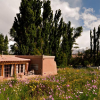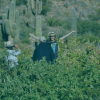Some mates with… Claudio Zucchino
08 Apr 2022
We chat with the Director of the Viñas de Uquìa establishment in Jujuy where organic production, beautiful gastronomic productions and healthy living come together to offer a set of ecotourism experiences.

How did the Ayni space come about?
The project began in 2002 when we began planting the vines at more than 3,000 meters above sea level (masl), which made us one of the highest vineyards in the world. We are in the “Viñas de Uquía” farm, which is located in the homonymous department in Humahuaca, Jujuy, irrigated by two streams that flow all year round and provide us with the necessary water for the vines. This is how we carry out a certified organic farm where, in addition to vines, we have a garden that provides organic products to the locals.
What meaning does Ayni have?
Ayni in Aymara means “reciprocity”. We wanted to give it a name that refers to the cultural reality in which we are immersed. Since the company emerged, we have sought a harmonious and mystical proposal, an encounter with nature, promoting a relationship of exchange, dialogue and that is opposed to unidirectional extractive logics.
What are the climatic characteristics that make Uquía, Jujuy such a special place?
We produce organic grapes in heights. In this terroir, the plants must face a hostile climate according to all viticulture treaties. A desert climate with less than 150 mm of annual rainfall and daily sun. Only at harvest time there are some cloudy and rainy days, the rest of the wine year is very dry. The height provides a thermal amplitude that is key and is located at about 20 degrees, which allows the maturity of the fruits to achieve an optimal rhythm. In addition, the winds are a determining factor, in some areas a warm northern front arrives that favors maturation while in the higher areas the cold south wind moderates the temperature in the hottest season.
Why did you decide to turn to organic grape production?
Reciprocity is a strong idea for the company. Therefore, if we want the earth to give us the best it has, we cannot contaminate it with chemical products. So in that relationship of reciprocity, in order to receive the fruits of the earth, I have to give it a series of care, respect and considerations that go through the non-pollution of the environment. That is why organic production is an element that allows us to establish that type of healthy relationship with our land.
What is the value of certification?
I would like to point out that the organic grape with which we produce the wine has organic certification, but not the wine. We like to be able to say that we are organic producers because we comply with what is established in the organic regulations.
What characteristics does the Uraqui wine that they make with organic grapes have?
Uraqui in the Aymara language uraqui means “terroir”. That is why in the winery we produce our wine that has already gained local, national and international prestige. It was made by Marcos Etchart, who accepted the challenge of making a natural wine without wood, avoiding the addition of chemical products. The result is a red cut that is characterized by its fineness, its freshness and its palette of floral, spicy and fruity aromas. Throughout the process we do not use chemical products that are not approved in organic agriculture. is in our bottles is the fruit of the land, our ancestral cultures and current environmental reflection to stop the pollution of the planet.Thus we manage to produce an average of between 4,000 and 7,000 bottles per year.
How is the wine stowage process?
After production, we bottle the wine at 18 months and then aestivate it for 8 years. For this fundamental process we have our Cava Mina Moya, an abandoned mining tunnel at 3640 meters above sea level, transformed into a cellar with exquisite natural conditions for the maturation of our wines. Constant temperatures and humidity, added to absolute silence, stillness and darkness create the ideal way to age wine, obeying ancestral mandates.
What is the importance of the prizes obtained by the production of wines?
The acknowledgments we have received are very good for us because they have to do with wine criticism. It fills us with pride that consumers choose our wine, which drives us to continue producing with quality.
What other activities do you carry out in the Viñas de Uquia?
We have a hostel and an organic garden. The Viñas de Uquía inn has five rooms with private bathrooms and a spacious living room with mountain views. With a bioclimatic design, it uses solar energy for heating and water heating, as well as an effluent treatment plant. The inn is the center of a group of excursions, treks, caravans of llamas and guided tours. The guest can take walks, free walks and cooking workshops. We also have a field store and organic garden.
What plantations do they have in the garden?
We are mainly farmers, so we plant 5 varieties of potatoes, 3 varieties of corn, 3 varieties of quinoa, broad beans, garlic and onions.
How do they use the products?
We propose an Andean-inspired gastronomy based on the nobility of the organic products that we obtain from our garden, as well as others produced by peasants from the puna, ravine, temperate valleys and yungas that we have known for years. The route of the annual cycle offers us dishes with what the season provides.
How can visitors get to know the Uquìa Vineyards?
We have a website http://www.vinasdeuquia.com.ar/ and we invite you to contact us by phone: +54 9 388 4076174/ Whatsapp: +54 9 388 4076174. You can also send us an email to hosteriavinasdeuquia@gmail.com.
We are 2 hours by car from Jujuy Airport (JUJ).
100 km. of San Salvador de Jujuy.
Less than 30km from Tilcara and Humahuaca.
Galería de Fotos





